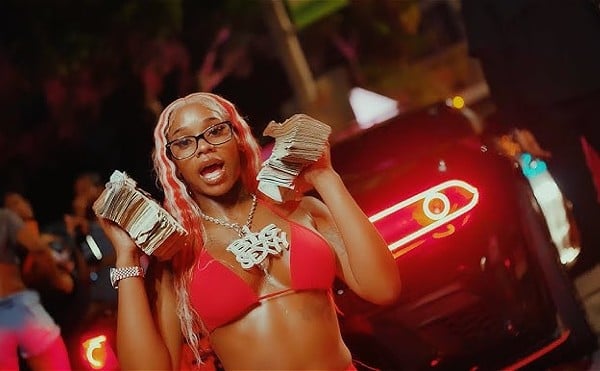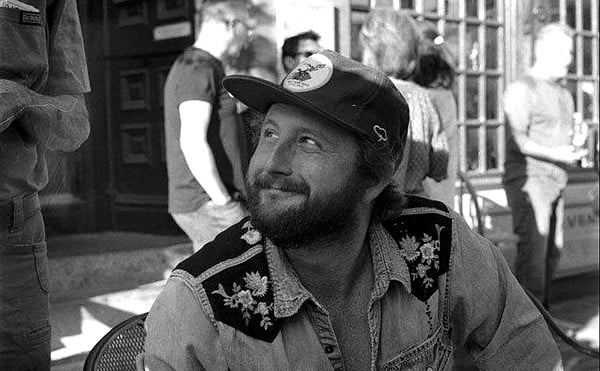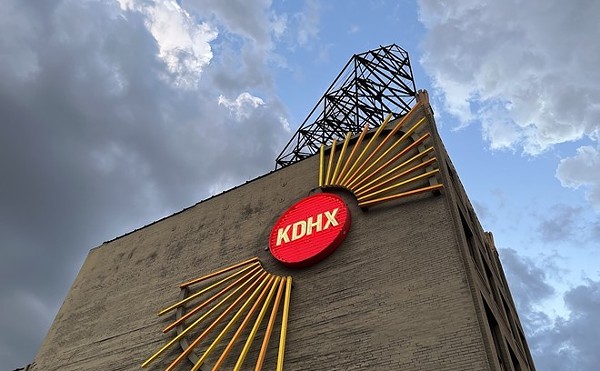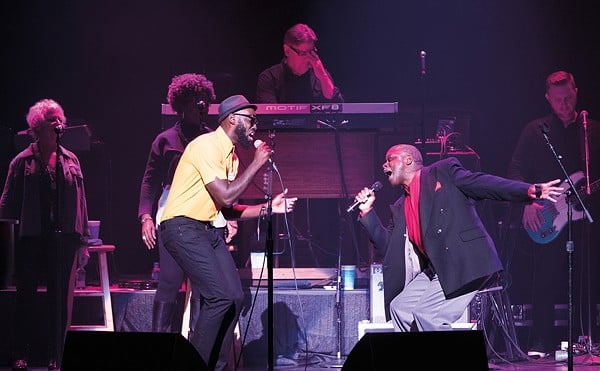Though both acts share a preoccupation with the effects of religion and faith on the youth of today, each approaches the subject from a different direction. Employing a grandiose, arena-rock approach and a few dramatic touches, the Hold Steady chronicles small-town kids as they struggle to find some sort of redemption for their sins. Conversely, the Thermals sound small but think big: three-chord, no-frills songs detail a not-so-distant future in which a fascist state claims to rule by divine right and calls down the fury of an angry God on transgressors. So when both bands share the stage at Off Broadway Thursday, they won't just be playing for your applause — they'll be playing for your souls.
The Hold Steady's oeuvre hinges on the belief that the most important times in our lives happen between the ages of sixteen and twenty-one, that our revelations and mistakes will shape who we become. Boys and Girls in America continues a microcosmic view of small-town America, a storytelling technique that songwriter Craig Finn perfected on 2005's Separation Sunday.
Sunday's main character is Holly (short for Hallelujah), who staggers in a druggy haze between false idols and phony saviors. Singer Craig Finn's use of Christian imagery runs through that album in sneaky, subtle ways: Holly wears a cross across around her neck not as a sign of faith but as a gaudy bauble; drug dealers quote passages from stolen Bibles and perform baptisms with nitrous tanks; and Holly is metaphorically reborn, broken and bruised at an Easter Sunday Mass. The last words we hear come from the choir loft, as voices simply say "welcome back" to their prodigal daughter.
It's hard to miss all the symbolism in these songs, but it's easy to ignore the implications. The Hold Steady likes to tell people that it aspires to be the world's best bar band, but that downplays the bigger concerns on its records. Maybe it's easier to play unassuming postmodern classic rock and sneak a little dogma under the door. The sleight-of-hand works: The Hold Steady's power lies in its lack of pretension, its refusal to pose as a big-idea band. Instead, its little ideas burrow their way into the listener's mind. Finn and company aren't looking to convert anyone, but they seem to recognize that redemption can come in many forms — rock & roll, of course, but also old-fashioned religious faith.
If Separation Sunday sounds like a novella set to music, the Thermals' The Body, the Blood, the Machine feels like a dystopian epic condensed into a 35-minute burst. After two albums of strident punk and lo-fi nuggets, no one expected the Thermals to aim this high, let alone succeed. On the album, the personal is political — and the political landscape is an unforgiving right-wing Christian state. The album's opener, "Here's Your Future," gives a thumbnail sketch of God's demands on Noah and Jesus, recalling nothing so much as Dylan's "Highway 61 Revisited" ("God said to Abraham, kill me a son"). This is Old Testament, fire-and-brimstone stuff.
The Body plays out against fears of a totalitarian government that rules by fear and religious authority, though the bulk of the songs find singer Hutch Harris struggling with his relationship with a god he sees as merciless and distant. On the album's surface, the scope is huge, but at heart, these songs are as personal as a prayer.
Harris's fears are best heard on the single "A Pillar of Salt," as he addresses man's fallen nature with a direct opening line: "We were born to sin / We don't think we're special, sir / We know everybody is." It is the simplicity of a Sunday-school lesson repurposed as a weapon and a credo. How can one live up to God's expectations of purity and goodness when we're born with the handicap of original sin?
Like Separation Sunday, the Thermals end this album hopefully. The main characters have escaped the clutches of the government and perhaps even the grasp of God. The result is not atheism (God, however distant, does exist in Harris' world) or nihilism (the protagonist of The Body has faith and fervor, just not in a religious or patriotic sense). Instead, the Thermals ask the listener to exit the album's fever dream and make sense of their own world, one where the line between church and state is blurry and blind allegiance to either is dangerous.
The bands offer two different means of redemption, two ways of living in a world wrought with confusion, temptation and hopelessness. But at their core, these are rock bands, and they're as interested in showing you a good time as they are in making you think big, heavy thoughts.Think of their sets as theological discussions to which you can dance, drink and sing along. — Christian Schaeffer
9 p.m. Thursday, March 15. Off Broadway, 3509 Lemp Avenue. $12. 314-773-3363.
Luck O' the Draw
Traditional Irish music possesses many outstanding qualities — most notably, lyrics that are easy to remember and melodies that encourage clapping along (two things that are way fun when you're on beer number twentysomething). But no one wants to be the guy who's loudly and mistakenly belting, "Crack-whore my daddy-o, there's whiskey in the bar!" So brush up by picking the correct ending to the following lyrics.
1. I eat when I'm hungry,
I drink when I'm dry
And if moonshine don't kill me
A. I'll live till I die.
B. Then really, what's the point?
C. No Irishman am I.
D. The smokes probably will.
2. Whiskey, you're the devil, you're leading me astray
Over hills and mountains into Americay
You're sweeter, stronger, decenter
You're spunkier than tea
A. Aw, who am I kidding? I can't stay mad at thee!
B. I'll see you right after work there, homey.
C. Oh, whiskey, you're me darlin' drunk or sober!
D. I'd rather have a bottle in front o' me than a frontal lobotomy.
3. Hunt the hare and turn her
Down the rocky road
And all the ways to Dublin
A. The one that's in Ohio.
B. Now which way do we go?
C. Don't make me turn this damn car around.
D. Whack-fol-lol-de-ra.
4. Now the publican's anxious for the quota to come
There's a far-away look on the face of the bum
The maid's gone all cranky and the cook's acting queer
A. What a terrible place is a pub with no beer.
B. And the band's out of tune and hurting my ear.
C. So away from this port, my boat I shall steer.
D. I'm feeling worse now than when I got here.
5. Well he made a big apology
I told him then goodbye
Saying, "When next you want a beating
Write:
A. 'The Keg, She Has Gone Dry.'"
B. 'Our Reuben's Not On Rye.'"
C. 'No Irish Need Apply.'"
D. 'Bono's Gay.'"
Answers:
1. A ("The Moonshiner")
2. C ("Whiskey You're the Devil")
3. D ("The Rocky Road to Dublin")
4. A ("The Pub With No Beer")
5. C ("No Irish Need Apply")





